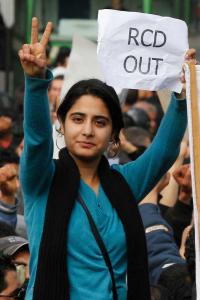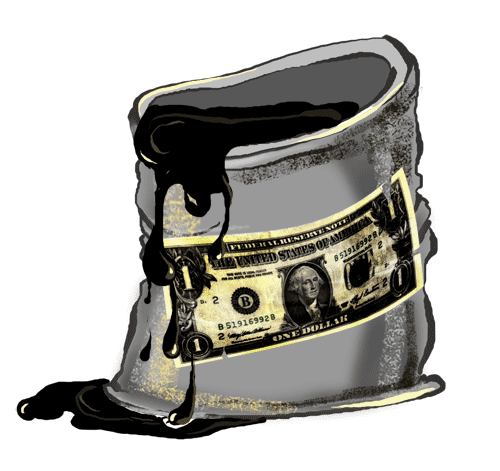Middle East
Tariq Ali on `The Palestine Papers': Total capitulation

Mahmoud Abbas with US President George W. Bush and Israel's Prime Minister Ariel Sharon at the Red Sea Summit in Aqaba, Jordan, on June 4, 2003.
Tunisia: Masses create people's power bodies in neighbourhoods and workplaces

Demonstration against RCD ministers, January 19. Photo by Nasser Nouri.

[For more on Tunisia in revolt, click HERE. Scroll down for earlier reports and analysis. ]
UGTT demands dissolution of 'unity government'
Statement of the National Administrative Commission of the General Union of Tunisian Workers (UGTT) issued on January 21, 2011 (first published in English on MRZine).
1. The General Union of Tunisian Workers is a national organisation necessarily interested in political affairs, given its history of struggle during the colonial epoch and the period of the construction of the modern state, considering the dialectical links among economy, society, politics, and culture in the process of development, but out task has become more urgent than ever.
(Updated Jan. 16) Tunisia's intifada topples tyrant: 'Yezzi fock!'

[For more on Tunisia in revolt, click HERE.]
On January 14, the BBC reported that the mass uprising in Tunisia had toppled that country's Western-backed tyrant after weeks of protests and government repression, which has cost the lives of dozens of Tunisians. According to the BBC:
Tunisia's President Zine al-Abidine Ben Ali has stepped down after 23 years in power, amid widespread protests on the streets of the capital Tunis. In a televised address, Prime Minister Mohammed Ghannouchi said he would be taking over from the president. A state of emergency was declared earlier, as weeks of protests over economic issues snowballed into rallies against Mr Ben Ali's rule. Unconfirmed reports say Mr Ben Ali and his family have left Tunisia. The reports suggest that the deposed president is looking for a place of asylum, with French media saying that French President Nicolas Sarkozy has turned down a request for his plane to land in France.
The articles below explain some of the background to the uprising.
Why calls for a ban on the wearing of the burqa help the racists
Pip Hinman addresses the meeting on November 24, 2010.
By Pip Hinman
The Flame, October-November 2010 -- Green Left Weekly's Arabic-language supplement
Soubhi Iskander.
November 2, 2010 -- With the help of Socialist Alliance members in the growing Sudanese community in Australia, Green Left Weekly -- Australia's leading socialist newspaper -- publishes a regular Arabic language supplement. The Flame covers news from the Arabic-speaking world as well as news and issues from within Australia. Editor-in-chief is Soubhi Iskander is a comrade who has endured years of imprisonment and torture at the hands of the repressive government in Sudan.
Turning the tide of oil in US and world politics

By Dan La Botz
Palestine: BDS movement recalls anti-apartheid tactics, responsibilities and controversies

Apartheid Wall, near Jerusalem. Photo by Patrick Bond.
By Patrick Bond, Ramallah
October 13, 2010 -- On a full-day drive through the Jordan Valley late last month, we skirted the Earth’s oldest city and lowest inhabited point, 400 metres below sea level. For 10,000 years, people have lived along the river that separates the present-day West Bank and Jordan.
Since 1967 the river has been augmented by Palestinian blood, sweat and tears, ending in the Dead Sea, from which no water flows; it only evaporates. Conditions degenerated during Israel’s land-grab, when from a peak of more than 300,000 people living on the west side of the river, displacements shoved Palestinian refugees across into Jordan and other parts of the West Bank. The valley has fewer than 60,000 Palestinians today.
In defence of South African academics' successful call for a boycott of Israel

Drawing comparisons to South African apartheid policies: Israel requires Palestinians to carry identification documents that restrict their movement. UN photo.
By the Palestinian Campaign for the Academic and Cultural Boycott of Israel (PACBI)
Occupied Ramallah, September 30, 2010 -- PACBI welcomes the decision[1] on September 29, 2010, by the Senate of the University of Johannesburg (UJ) "not
to continue a long-standing relationship with Ben Gurion University
(BGU) in Israel in its present form" and to set conditions "for the
relationship to continue". The fact that the UJ Senate set an ultimatum[2] of six months for BGU to end its complicity with the occupation army
and to end policies of racial discrimination against Palestinians is a
truly significant departure from the business-as-usual attitude that had
governed agreements between the two institutions until recently.

